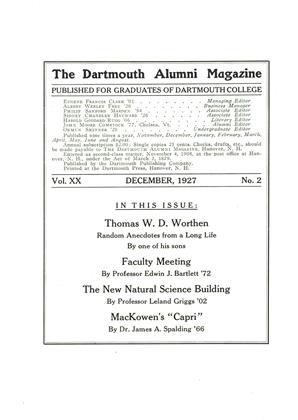After a long search in foreign bookshops, the college library had just received a small but very interesting and romantic gift from the pen of a former member of the class of '66. This little book of 198 pages, with an excellent map of Capri, i-s divided into chapters on the geology, climate, history, habits and customs, and general description of Capri, with additional divisions concerning the visit of the Emperor Tiberius to the Island, and its history during the middle ages.
Those who are interested in the history of Italy, from many points of view, will find the little book very attractive. The historical part contains many items difficult to obtain from other sources or in almost any other library. We commend it to students of Roman History and so pass it along to the shelves of the college library.
Before, however, the book remains there and possibly collects some dust from not being used, a few words should be said concerning its author and how the book came to be written.
General John Clay MacKowen of the Confederate Army was, as we understand it, captured during the Civil War, but a.fter exchange with a prisoner of equal rank, he felt disinclined to return to his Louisiana home. Looking around among the various colleges in the North to finish his education, he decided to unite his career with that of the class of '66 at Dartmouth. Arriving in the spring of 1864, he was graduated in due course, but had no part at the Commencement.
.Leaving Hanover to return to his southern home, and finding repulsive the emancipation of the slaves and too flagrant and abominable the government of his state by the carpet-bag adventurers, he shook the dust of his native state from his feet and made his way to the Island of Capri where he spent several years in the study of its history and of the Italian language. During a part of this time also, he studied medicine at Munich and obtained there a degree of Doctor of Medicine.
Everybody has heard of the wonderful Blue Grotto in the Island of Capri, but a good many American tourists have found, to their regret, when ready to explore it that a state of high tides or a heavy sea or contrary winds have prevented them from entering to explore its marvellous interior. Nobody ever seemed to be ingenious enough to suggest any certain or daily means of exploring the Grotto until it occurred to MacKowen that he might sink a shaft down from his land into its roof and so provide a permanent entrance with a modern elevator for passengers for every day in the year. He broached the idea to one or two people who thought it highly excellent, but the rumor soon reached the ears of the seamen, owners of boats, who made a living by carrying passengers in under the low arch on the sea side of the Grotto, into its inside. Hearing that their means of living was to be threatened by the suggested vertical shaft, it has been said that MacKowen received a "Black-Hand" notice that if he persisted in his efforts to destroy the livelihood of the seamen which was a trade that had passed by a sort of inheritance for centuries through related families on the Island, his life would not be worth living.
Dismayed at this threat, it was said that he left Capri very suddenly, and made his way back to his native soil. But fate had not played her worst trick upon him even them, for he soon quarreled with a gentleman in his neighborhood concerning a large coil of wire fencing which MacKowen insisted belonged to his sister, while the other man claimed it for his own property. After a great deal of bitter talk, they shook hands with apparent cordiality, but the last words exchanged between them were: "We will shoot at sight at our very next meeting."
Not long afterwards, they met by chance, pulled out their "guns," the other man being a little more rapid, MacKowen was so seriously wounded that he died soon afterward.
The other man was arrested and tried for his life, but the jury promptly acquitted him on the ground of selfdefense in an honorable duel between two southern gentlemen.
It is so rare for a book to be written by so curious and adventurous a character and a graduate of Dartmouth College, that a few words to this effect seem worthy of publication in the ALUMNI MAGAZINE.
The Base of the Library Tower
 View Full Issue
View Full Issue
More From This Issue
-
 Lettter from the Editor
Lettter from the EditorEditorial Comment
December 1927 -
 Article
ArticleTHOMAS W. D. WORTHEN
December 1927 By One of His Sons -
 Article
ArticleFACULTY MEETING
December 1927 By Professor Edwin J. Bartlett '72 -
 Article
ArticleALUMNI ASSOCIATIONS
December 1927 -
 Class Notes
Class Notes1918
December 1927 By Frederick W. Cassebeer -
 Class Notes
Class NotesClass of 1911
December 1927 By Nathaniel G. Burleigh










